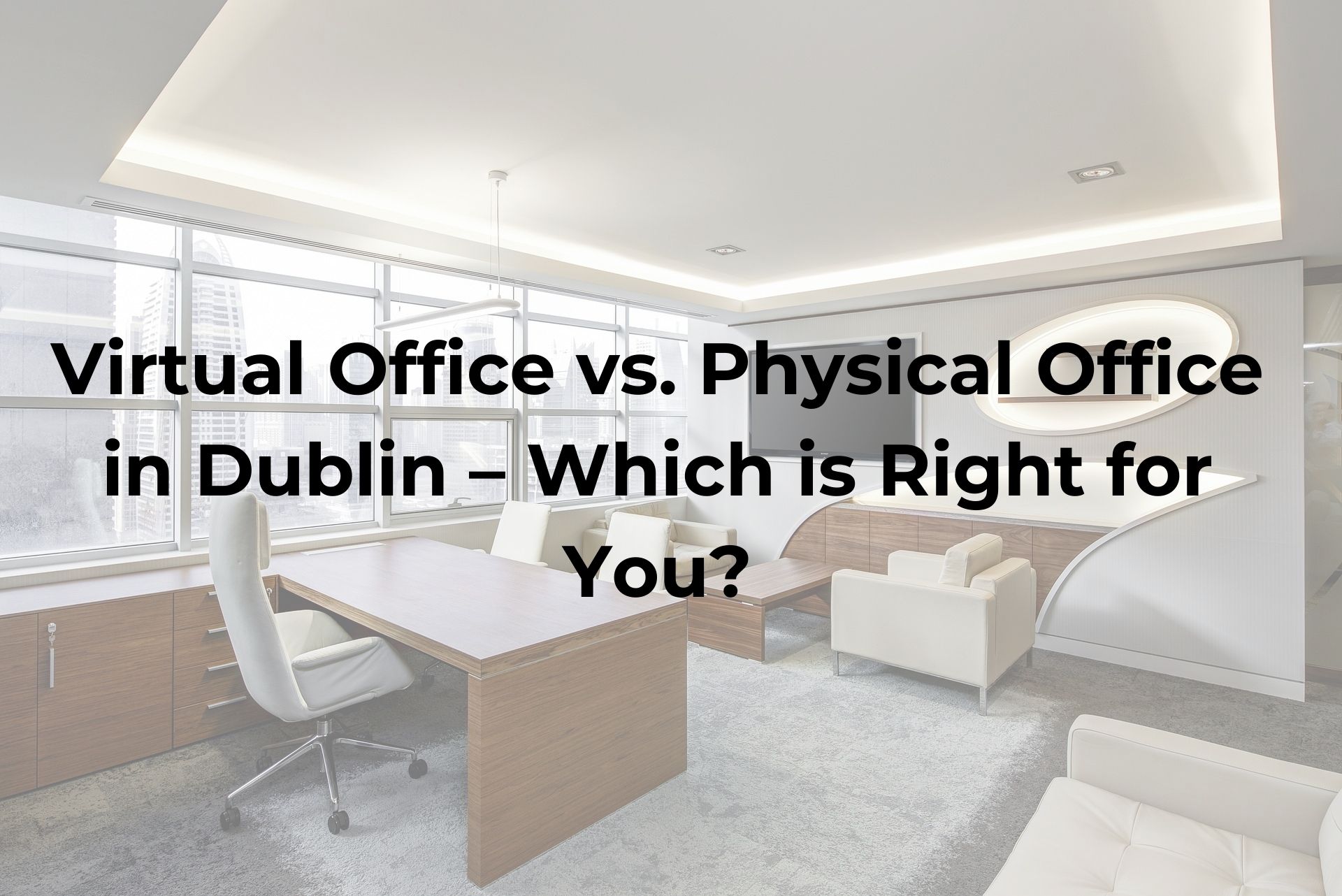Virtual Office vs. Physical Office in Dublin – Which is Right for You?
Choosing between a virtual office and a physical office in Dublin is a crucial decision for businesses of all sizes....

Choosing between a virtual office and a physical office in Dublin is a crucial decision for businesses of all sizes. With modern technology enabling remote work, many companies are exploring virtual offices as a cost-effective and flexible solution. However, traditional physical offices still hold value for businesses that require a dedicated space for operations, meetings, and team collaboration. If you are considering a virtual office Dublin, understanding its benefits and limitations compared to a physical office is essential. In this blog, we will compare the advantages and disadvantages of each option to help you determine the best fit for your business.
Understanding Virtual Offices
A virtual office provides businesses with a prestigious address, mail-handling services, and access to meeting rooms without the need for a physical workspace. This model allows employees to work remotely while maintaining a professional business presence.
Advantages of a Virtual Office
- Cost-Effective: Virtual offices eliminate expenses related to renting a physical space, including utilities and maintenance costs.
- Flexible Work Environment: Employees can work from anywhere, fostering a better work-life balance.
- Professional Business Address: Establishing credibility without renting a physical location is a major benefit.
- Access to Meeting Rooms: Many virtual office providers offer conference rooms for client meetings when needed.
- Scalability: Businesses can expand easily without the logistical challenges of relocating a physical office.
Disadvantages of a Virtual Office
- Lack of Physical Presence: Some clients prefer to visit a physical location.
- Limited Collaboration Opportunities: Remote work can make team communication and collaboration challenging.
- Potential Employee Isolation: Employees working remotely may feel disconnected from the company culture.
- Restricted Access to Office Facilities: Businesses requiring physical equipment may face limitations.
Understanding Physical Offices
A physical office is a dedicated workspace where employees work in person. It provides a structured environment and allows for direct team interaction.
Advantages of a Physical Office
- Enhanced Collaboration: In-person interactions promote teamwork and productivity.
- Professional Client Meetings: A dedicated office space enhances professionalism when meeting clients and business partners.
- Stronger Company Culture: Employees working together in one space can develop a more cohesive company culture.
- Dedicated Infrastructure: Businesses have direct access to essential tools, equipment, and a customized workspace.
- Better Supervision: Managers can oversee employees more effectively, improving workflow and accountability.
Disadvantages of a Physical Office
- Higher Costs: Renting and maintaining an office in Dublin can be expensive.
- Fixed Location: Unlike a virtual setup, employees must commute, which can be time-consuming.
- Less Flexibility: Businesses are bound to lease agreements, making it harder to scale quickly.
- Additional Overhead Expenses: Bills for utilities, maintenance, and office supplies add up over time.
Which Option is Right for You?
The choice between a virtual office and a physical office depends on your business needs, budget, and work style. Here are some factors to consider:
When to Choose a Virtual Office
- If you are a startup or freelancer looking for a professional address without high rental costs.
- If your business primarily operates online with minimal client-facing interactions.
- If your team works remotely and values flexibility.
- If you want to establish a business presence in Dublin without committing to a physical location.
When to Choose a Physical Office
- If your business requires in-person collaboration and teamwork.
- If you frequently meet with clients and need a professional office setting.
- If your industry demands a dedicated workspace for daily operations.
- If you prefer a structured work environment to enhance employee productivity.
Hybrid Office Model: The Best of Both Worlds
A hybrid office model combines the benefits of both virtual and physical offices. Many businesses in Dublin are adopting this approach by maintaining a small physical space for essential operations while allowing employees to work remotely as needed. This model provides cost savings while still maintaining a professional environment for meetings and collaboration.
Conclusion
Both virtual offices and physical offices in Dublin have their unique advantages and challenges. The best choice depends on your business model, industry requirements, and financial considerations. By evaluating your specific needs, you can determine whether a virtual setup, a traditional office, or a hybrid model is the right fit for your company. Whatever you choose, Dublin offers excellent opportunities for businesses to thrive in both digital and physical spaces.
FAQs:
1. What is a virtual office, and how does it work?
A virtual office provides businesses with a professional address, mail-handling services, and access to meeting rooms without requiring a physical workspace. Employees work remotely while maintaining a business presence in Dublin.
2. What are the main benefits of choosing a virtual office in Dublin?
A virtual office is cost-effective, offers flexibility, provides a professional business address, and allows scalability without the burden of a physical office lease.
3. When should a business choose a physical office over a virtual office?
A physical office is ideal for businesses that require in-person collaboration, frequent client meetings, dedicated workspace, and structured supervision for employees.
4. Can a business combine both virtual and physical office models?
Yes, a hybrid office model allows businesses to maintain a small physical space for essential operations while enabling employees to work remotely, offering flexibility and cost savings.
5. Is a virtual office suitable for all types of businesses?
A virtual office works best for startups, freelancers, online businesses, and companies with remote teams. However, businesses that rely on in-person interactions may benefit more from a physical office.



